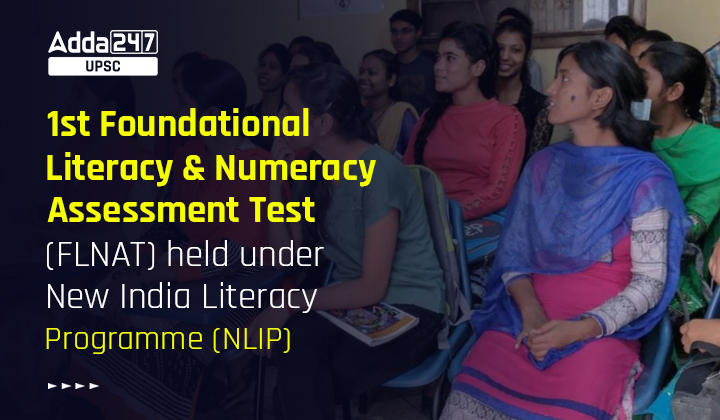Table of Contents
Foundational Literacy and Numeracy Assessment Test (FLNAT): it is a national level test to evaluate the reading, writing, and numeracy abilities of learners. Foundational Literacy and Numeracy Assessment Test (FLNAT) under New India Literacy Programme is also important for UPSC Prelims Exam 2023 and UPSC Mains Exam (GS Paper 2- Various Government Policies and Programs for development of different sectors like human resources and education).
Foundational Literacy and Numeracy Assessment Test (FLNAT) in News
On March 19th, 2023, the first Foundational Literacy and Numeracy Assessment Test (FLNAT) was administered in 10 states across the country under Nav Bharat Saaksharta Karyakram (New India Literacy Programme ).
1st Foundational Literacy and Numeracy Assessment Test (FLNAT)
Under the 1st Foundational Literacy and Numeracy Assessment Test (FLNAT), the evaluation for individuals who are non-literate was carried out in government or aided schools located in states and union territories.
- Mandate: The purpose of the test was to evaluate the reading, writing, and numeracy abilities of learners enrolled in the Nav Bharat Saaksharta Karyakram, which is also known as the New India Literacy Program.
- Participation: The assessment included more than 22.70 lakh learners, including men and women who were over 70 years old.
- Implementation: Under the Foundational Literacy and Numeracy Assessment Test (FLNAT), volunteer teachers, including students from schools and colleges, provided assistance in teaching and learning activities.
Foundational Literacy and Numeracy Assessment Test (FLNAT) Participation
More than 22.70 lakh learners, including non-literates aged 15 and above, participated in the FLNAT event with the goal of achieving literacy upon passing the assessment.
- Among these learners were men and women over the age of 80 who expressed pride in being able to hold a pen.
- The learners were highly motivated to take the assessment test.
- The state of Madhya Pradesh had the highest number of participants, with 925,854 learners, consisting of 591,421 females and 334,433 males, exceeding the initial target of 535,000 learners.
Foundational Literacy and Numeracy Assessment Test (FLNAT) Significance
The DIKSHA platform of NCERT is promoting the use of local languages for online learning and encouraging learners to access learning content through this platform.
- The implementation of this scheme will be carried out through government or aided schools that are registered under UDISE.
- Learners will be certified twice a year through the administration of Foundational Literacy and Numeracy Assessment Tests in partnership with NIOS.
Nav Bharat Saaksharata Karyakram/ NLIP
The Indian government has approved the Nav Bharat Saaksharata Karyakram for implementation during the fiscal years 2022-2027, in accordance with the National Education Policy (NEP) 2020.
- The New India Literacy Programme scheme is designed to target individuals aged 15 years and above who are non-literate in the country, with a focus on females and educationally disadvantaged states.
- The NLIP scheme is comprised of five components, namely Foundational Literacy and Numeracy, Critical Life Skills, Basic Education, Vocational Skills, and Continuing Education.
- To ensure effective implementation of the scheme across the country, volunteer teachers, including NYKS volunteers, community members, students from schools and higher education institutions, as well as those from teacher education institutions, will participate in teaching and learning activities.
New India Literacy Program (NLIP) Objectives
New India Literacy Program (NLIP)/ Nav Bharat Saaksharata Karyakram aims to bring under the purview of literacy not only foundational literacy and numeracy but also other components which are necessary for a citizen of 21st century such as-
- Critical life skills including financial literacy, digital literacy, commercial skills, health care and awareness, child care and education, and family welfare; vocational skills development with a view towards increasing local employment
- Basic education including preparatory, middle, and secondary stage equivalency
- Continuing education including engaging holistic adult education courses in arts, sciences, technology, culture, sports, and recreation, as well as other topics of interest or use to local learners, such as more advanced material on critical life skills.
New India Literacy Programme (NILP)



 TSPSC Group 1 Question Paper 2024, Downl...
TSPSC Group 1 Question Paper 2024, Downl...
 TSPSC Group 1 Answer key 2024 Out, Downl...
TSPSC Group 1 Answer key 2024 Out, Downl...
 UPSC Prelims 2024 Question Paper, Downlo...
UPSC Prelims 2024 Question Paper, Downlo...




